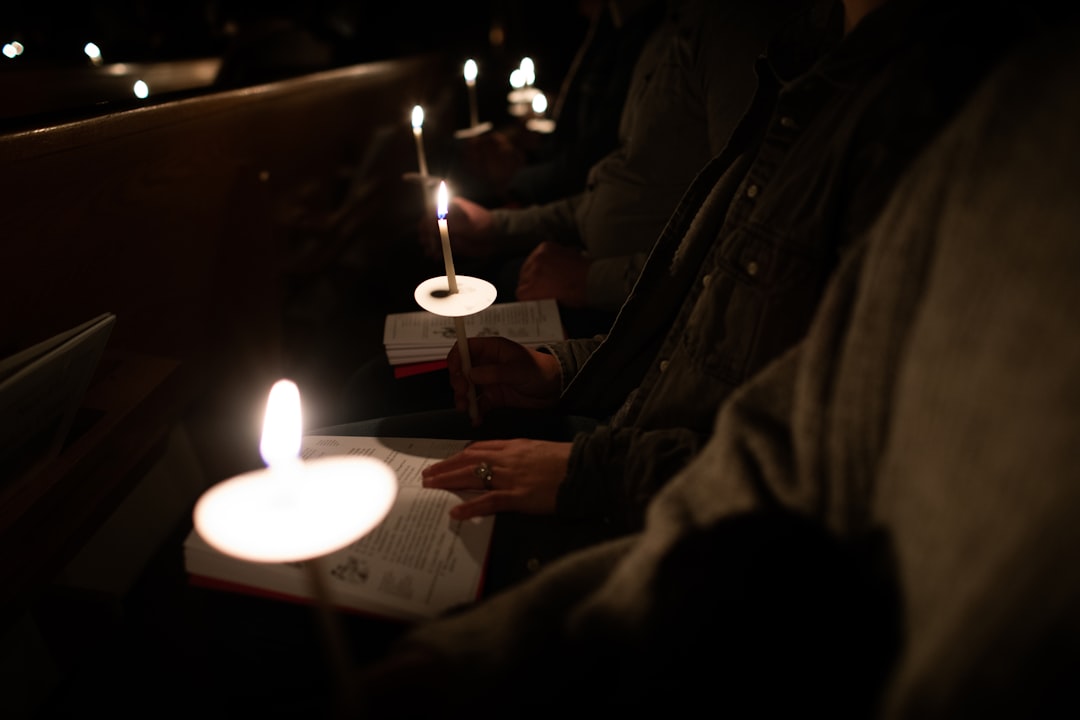Feeling lost in your grief and yearning for the way things used to be? We at Heavenly Counseling know that moving through the haze of loss is a journey you shouldn’t have to make alone. Grief is a natural response to losing someone or something dear, but if the pain becomes too much, it might be time to seek help. Everyone’s experience with grief is unique, and with a variety of therapeutic techniques, we can help find the right path towards healing for you.
Grief counseling is a journey of healing, not simply a conversation. It can involve individual therapy, group sessions, or creative outlets for expressing unspoken feelings. Seeking help isn’t a sign of weakness. It’s a brave step towards your new normal. Together, we’ll walk this path towards reclaiming your life.

We’ll walk you through a range of grief counseling techniques that stand as beacons of hope amidst the darkness. Whether you’re a seeker of solace or building a support system for someone who is, this journey of healing awaits.
The Two Forms of Grieving
When grief enters our lives, it doesn’t come in one shape or size. It’s as individual as we are. At Heavenly Counseling, we understand that different people experience grief in different ways. Broadly speaking, there are two forms of grieving: instrumental and intuitive. Let’s explore these to see how they relate to grief counseling techniques.
Instrumental Grieving: The Doers
Instrumental grievers tend to focus on tasks and problem-solving as a way to process their loss. They might not talk about their emotions much, but that doesn’t mean they don’t feel deeply. Think of them as “doers” who find comfort in action—perhaps organizing memorials or diving into work.
Intuitive Grieving: The Feelers
On the flip side, intuitive grievers are led by their emotions. They are the “feelers” who need to express their grief openly and are more comfortable with emotional displays. These individuals might seek out conversations, cry, or use art to navigate their pain.
Recognizing which form of grieving resonates with you, or a blend of both, can guide you towards the most suitable grief counseling techniques. At Heavenly Counseling, we tailor our approaches to fit your unique way of grieving, ensuring that you feel supported and understood at every step of your journey.
The Manifestations of Grief
Grief can feel like carrying an invisible weight that only you can sense. It’s not just sadness; it’s a complex blend of emotions and behaviors that can change how you see the world and interact with it.
A Tangle of Emotions
Grief brings a whirlwind of emotions. You might feel:
- Sadness, a deep, hollow feeling that lingers.
- Anger, which can flare up unexpectedly, sometimes at the one you’ve lost or at the world for continuing without them.
- Guilt, wondering if you could have done something differently.
- Fear, as the loss shakes your sense of security and life’s predictability.
- Relief, which can come with a side of guilt, especially if the loved one was suffering.
Behaviors That Speak Louder Than Words
How you act while grieving can be just as telling as how you feel:
- Withdrawing from social activities you used to enjoy because they feel meaningless or too overwhelming now.
- Sleep problems, like insomnia or sleeping too much, as your mind tries to process the loss.
- Changes in appetite, either eating too little or using food for comfort.
- Difficulty concentrating, making work or daily tasks feel insurmountable.
- Clinging to reminders of the loved one, like their clothing or personal items, to feel closer to them.
At Heavenly Counseling, we understand that these emotions and behaviors are all part of the grief experience. Our grief counseling techniques are designed to help you navigate these tough waters. We provide a space where your emotions are valid, and your behaviors are understood, not judged. Together, we’ll find a path through the pain, taking it one step at a time.
Grief Counseling Techniques
When you’re feeling lost in the sea of grief, you might wonder if there’s a lifeline out there to help you find your way back to shore. At Heavenly Counseling, we understand that and want to offer you a variety of grief counseling techniques to suit your unique journey.
Cognitive Behavioral Therapy (CBT) for Grief
CBT is like having a map that helps you navigate through the negative thoughts and emotions that come with loss. It’s about learning to recognize those thoughts, challenge them, and ultimately reshape them into a more positive outlook. This isn’t about ignoring your pain but about finding healthier ways to cope with it. (Bradley University)
Acceptance and Commitment Therapy (ACT) in Grief Counseling
With ACT, it’s like planting your feet firmly on the ground, even when grief tries to sweep you off them. You’ll learn to embrace your feelings instead of fighting them, which can help you start to heal. The key is to live your life according to what matters most to you, even in the midst of sorrow. (Bradley University)
Traumatic Grief Therapy: Addressing Severe Loss
Sometimes, grief hits like a storm, unexpected and devastating. Traumatic grief therapy is our way to provide shelter. It’s about finding routines that can bring calm and understanding that it’s okay to feel the way you do. You’re not alone, and we’re here to help you through the tempest. (Bradley University)
Complicated Grief Therapy: For Prolonged Grief
When the pain of loss doesn’t ease with time, it might be a sign of complicated grief. This type of therapy is like having a compassionate guide who helps you work through the tangled emotions and memories, finding a way to honor your loved one while also caring for yourself. (Bradley University)
Interpersonal Therapy: Healing through Relationships
Interpersonal therapy focuses on the here and now. It’s about strengthening your current relationships and forging new ones. Grief can make the world feel like a lonely place, but through connections with others, you can find the support you need to carry on. (Bradley University)
At Heavenly Counseling, we believe in walking with you on your path to healing. Whether it’s through CBT, ACT, or any other method, we’re committed to helping you find the grief counseling techniques that resonate with you and your experience.
The Role of Empathy and Creativity in Grief Counseling
Navigating through the waves of grief requires a supportive companion who truly understands your pain. This is where empathy shines in grief counseling. It’s not just about feeling sympathy, but about acknowledging and validating your unique grief experience. It’s like having a fellow traveler who understands the journey’s hardships, having journeyed through similar paths themselves.
In our sessions at Heavenly Counseling, we prioritize empathy. We strive to understand and appreciate your feelings without being overwhelmed by them. This approach allows us to offer not just a sympathetic ear, but also a solid foundation for your healing process.
Harnessing Creativity to Explore Grief
Creative expressions like art, writing, or music can be powerful tools in grief counseling. They provide a new language for emotions, transforming intangible feelings into tangible forms. This helps to uncover and address hidden corners of grief that traditional talk therapy might miss.
An effective technique in grief counseling is writing a letter to the departed. This method gives you the chance to express unspoken feelings, aiding in achieving personal peace and closure. This isn’t about role-playing, but more about facing and making sense of your thoughts, aiding in your understanding and healing journey. (Bradley University)
The Impact of Empathy in Counseling
Empathy goes beyond just feeling; it’s about connection. It helps build trust between you and your counselor, making it easier to open up and delve into the raw emotions of grief. When we, as your counselors, convey empathy effectively, it can significantly enhance the therapeutic relationship and the overall counseling experience.
Creativity as a Pathway to Healing
Creative methods in grief counseling are not just alternative strategies; they are pathways to healing that can resonate on a deeply personal level. By tapping into your creative side, you might discover insights about your grief that were previously hidden or too difficult to access through words alone.
At Heavenly Counseling, we recognize the power of empathy and creativity in the healing process and integrate them into our approach to grief counseling. Whether it’s through empathetic listening or creative exercises, we’re here to support and guide you as you find your way to peace and acceptance after loss.
The Importance of Professional Qualifications in Grief Counseling
When you’re navigating the choppy waters of loss, it’s crucial to have a skilled navigator at your side. That’s why professional qualifications in grief counseling are not just important—they’re essential. At Heavenly Counseling, our team’s expertise is rooted in extensive training and experience. Here’s why this matters:
Professional Support in Navigating Grief
Professionals proficient in grief counseling techniques offer valuable guidance in your grief journey. They’re skilled in identifying diverse grief responses and can adjust their approach to suit your specific needs. This expert help is key in assisting you to comprehend and process your feelings, lessen the risk of lasting psychological impacts, and move towards recovery.
A Foundation of Trust
Knowing that your counselor has the proper credentials can provide you with a sense of security and trust. This foundation is vital for opening up and working through deeply personal and painful emotions. Our counselors at Heavenly Counseling are not only qualified, but they also bring compassion and understanding to every session, creating a safe space for you to grieve.
High Standards of Care
Professional qualifications ensure that counselors are held to high standards of practice and ethics. This means you can expect confidentiality, respect, and a commitment to your well-being. Our team is dedicated to offering the highest standard of care, so you can focus on your journey to recovery without any additional concerns.
Continuous Learning and Improvement
The field of grief counseling is always evolving, with new research and techniques emerging. Counselors with professional qualifications are committed to continuous learning, which means they can bring the latest and most effective grief counseling techniques to their work with you.
At Heavenly Counseling, we’re proud of the professional qualifications that each of our counselors holds. We understand that the right training makes all the difference in guiding you through the process of grief. Our commitment to professional excellence is just one way we ensure that you’re getting the support you need to navigate your loss and rebuild your life. If you’re seeking a path through your grief, reach out to us for a complimentary consultation.
The Role of Bibliotherapy in Grief Counseling
Books as Healing Tools
When it comes to healing from grief, the value of a good book cannot be overstated. Bibliotherapy involves using literature to help individuals cope with emotional challenges, including grief. At Heavenly Counseling, we recognize the power of stories and information in aiding the healing process.
The Power of Shared Experiences
There’s comfort in knowing others have walked a similar path of grief. As Jaymie Byron, LMFT, says, “Reading about others’ journeys through loss can offer support and a feeling of connection.” This can be especially helpful for folks who might feel alone in their grief, providing a sense of understanding and empathy.
Expanding Coping Strategies
Books can also introduce new perspectives and coping strategies. Whether it’s a memoir of someone who has walked a similar path, a self-help book on grief, or a novel where characters navigate loss, these resources can offer insights and tools that we might not have considered before.
Accessible Support
For individuals in rural areas or those who might have limited access to counseling services, bibliotherapy offers an accessible form of support. It’s a way to engage with grief counseling techniques at your own pace and in the comfort of your own space.
Tailored Book Recommendations
We at Heavenly Counseling may suggest specific titles that resonate with your personal experience. This personalized approach ensures that the material is relevant and potentially more impactful for your journey through grief.
A Complement to Traditional Therapy
While bibliotherapy is a valuable tool, it’s often most effective when used in conjunction with traditional therapy sessions. Reading can open up new avenues for discussion and exploration in your counseling sessions, allowing for deeper reflection and understanding.
The Role of Kindness and Self-Care in Grief Management
Grieving demands kindness to self, just like you’d comfort a close friend. Grief counseling methods highlight self-care, embracing both emotional and physical care. At Heavenly Counseling, we believe self-care is crucial in navigating grief and encourages healing.
Simple Acts of Self-Kindness
Self-kindness means allowing yourself to grieve without judgment or timelines. It’s okay to feel your emotions fully, whether that’s sadness, anger, or even moments of joy. It’s like giving yourself a compassionate hug when you need it most.
Physical Self-Care Basics
Focus on the basics of physical self-care. This means getting enough sleep, eating nourishing foods, and engaging in physical activity. Exercise, for example, isn’t just about staying fit; it can be a powerful tool in managing the physical symptoms of grief.
Mindfulness Practices
Incorporating mindfulness practices, such as deep breathing or mindful walking, helps anchor you in the present moment. This can create a sense of calm amidst the storm of grief.
Creating a Self-Care Plan
Together, we can develop a self-care plan that resonates with you. Whether it’s through expressive therapy like art or music, or establishing a routine that includes time for reflection and relaxation, we’ll find what best supports your journey.
Seeking Support
Don’t hesitate to reach out for help if self-care alone isn’t enough. We are here to offer professional support and to walk with you as you navigate this challenging time. If you or someone you know is struggling, contact us today for compassionate grief counseling.
Managing grief isn’t about rushing to “get over” your loss. It’s about being kind to yourself, taking the time you need, and engaging in self-care practices that support your overall well-being.
The Nonlinear Nature of Grief
Grief doesn’t follow a straight path. It’s a tangle of emotions that can catch you by surprise. As we at Heavenly Counseling understand, the journey through grief is unique for everyone. It can involve a range of emotions and stages, including denial, anger, bargaining, depression, and acceptance. These stages aren’t necessarily experienced in order and can recur unpredictably.
Denial: A Buffer Against Sudden Loss
Initially, you might not accept the reality of the loss. Denial serves as a protective buffer, giving your heart time to catch up with what your mind knows. This phase can involve shock or disbelief, providing temporary respite from the pain.
Anger: The Search for Blame
Anger can emerge as a response to feeling powerless or abandoned. It’s a natural part of the healing process. Recognizing this anger is an essential step, and expressing it in a healthy way can lead to deeper healing.
Bargaining: If Only We Could Turn Back Time
Bargaining often comes with “if only” statements. It’s a desperate attempt to regain control or to postpone the hurt. But it’s also a sign that you’re starting to confront the reality of the situation, even if you’re not ready to fully accept it.
Depression: The Deep Sorrow of Loss
Depression in grief is a profound sadness that reflects the true extent of your loss. This is a normal and appropriate response—not a sign of mental illness.
Acceptance: Learning to Live With Loss
Acceptance doesn’t mean you’re okay with what happened. Rather, it’s about recognizing that this new reality is permanent. You don’t have to like it, but eventually, you find a way to live with it.
At Heavenly Counseling, we guide you through these grief counseling techniques, acknowledging that your process may circle back to any stage at any time. Grief is not a problem to be solved but an experience to be carried through with support and understanding. If you’re experiencing grief, remember you’re not alone. Let us help you navigate this challenging time.
Restoration-Oriented Activities: Creating a New Normal after Loss
After a significant loss, finding a sense of normalcy can feel like an uphill battle. At Heavenly Counseling, we understand that part of the healing journey involves discovering a new balance in life—a “new normal.” Here’s how restoration-oriented activities can play a pivotal role in this process.
Embracing Change with New Habits
Loss can leave a gaping void in our daily lives. Engaging in restoration-oriented activities means filling that space with new routines and habits. It’s about creating structures that provide comfort and a sense of predictability in the midst of chaos. For instance, starting a new hobby or committing to a regular exercise routine can be powerful steps towards regaining control.
The Distraction Factor
Let’s be honest—sometimes, we need a break from the intensity of grief. Healthy distractions, like immersing ourselves in a good book or a creative project, can offer temporary relief and are an essential part of coping. By focusing on something engaging, we give our minds permission to step away from our sorrow, even if it’s just for a short while.
Moving Forward with Purpose
Restoration doesn’t mean forgetting; it means building upon the foundation of what was lost and moving forward with purpose. It’s about finding meaning in new endeavors and allowing them to bring joy and fulfillment into our lives once again.
We’re Here to Support You
At Heavenly Counseling, we’ll guide you through incorporating these restoration-oriented activities into your life. We believe that through these actions, you can find the strength to create a fulfilling new chapter after loss. If you’re struggling to find that new normal, reach out to us, and together we’ll explore the paths to healing and recovery.
Loss-Oriented Activities: Processing the Loss and Finding Meaning
When you’re dealing with the pain of losing someone special, like our client Sarah, not only adjust to a new life but also to face the loss head-on. This is where loss-oriented activities come into play. They are vital grief counseling techniques that help you process what you’ve gone through and make sense of it all.
Reflecting and Remembering
One of the first steps is to give yourself permission to reflect on the memories of the person you’ve lost. Sharing stories about them with friends or family can be a comforting way to remember the joyful times. It’s a step toward honoring their impact on your life.
Writing as a Tool for Healing
Expressive writing is another powerful method. You might find peace by writing a letter to your loved one, expressing all the things left unsaid. It’s a direct way to confront your feelings and can lead to a sense of closure.
Creative Expression
For many, creative activities like painting or music provide a non-verbal outlet for emotions. It’s not about the end product but the process of pouring your feelings into something tangible.
Rituals and Remembrance
Creating personal rituals can also be a meaningful way to process grief. This might include lighting a candle on significant dates or visiting a place that was special to your loved one. These acts keep their memory alive and acknowledge the role they still play in your life.
Finding Meaning
Lastly, a crucial part of navigating grief is to seek meaning in the loss. This could involve volunteering for a cause your loved one was passionate about or starting a project in their honor. Such actions can provide a sense of purpose and connection to the person you miss.
At Heavenly Counseling, we understand the profound impact of loss. We’re here to support you with a range of grief counseling techniques that honor your unique journey. It’s okay to mourn, to remember, and to find a path forward that keeps your loved one’s legacy alive. If you need help processing your loss and finding meaning, reach out to us. We’re here to help you through this journey, step by step.
Conclusion
Grief is a profound, personal journey that reshapes our world. It’s a path paved with intense emotions, from sadness to anger, and it can feel isolating at times. However, as we at Heavenly Counseling understand, with nurturing guidance and grief counseling techniques, walking through the shadow of loss can lead toward a place of healing and peace.
Grief is a lifelong journey, and as Jaymie Byron, LMFT points out, it’s about learning to live with the loss, not getting over it. At Heavenly Counseling, we provide compassionate support through various grief therapy techniques. These include Cognitive Behavioral Therapy (CBT) and Mindfulness-Based Stress Reduction, which arm you with practical tools to navigate this profound journey.
Our approach is holistic, integrating therapeutic modalities that range from creating comforting rituals to expressive art therapy, all aimed at honoring your unique grieving process. We weave in restorative routines to help you rediscover a sense of normalcy while acknowledging that grief comes in waves—sometimes unpredictable and powerful.
The journey through grief is not linear; it meanders through stages of denial, anger, bargaining, and depression before reaching acceptance. Our role is not to rush you through these stages but to offer a steady presence, helping you to find your footing with each step.
As we journey together, we also recognize the power of community. Grief therapy is complemented by peer support, which can be as vital as professional guidance. Both are necessary for healing, as Jaymie Byron articulates.
In closing, self-care and patience are your allies. Be gentle with yourself, and know that it’s okay to reach out for help. Our team at Heavenly Counseling is here to accompany you on your path. For further reading and resources, explore our dedicated sections on grief therapy and support groups.
Embrace the journey through grief, knowing that with time, support, and the courage to face each day, the weight of sorrow can transform into a testament of love and the strength to carry on.






